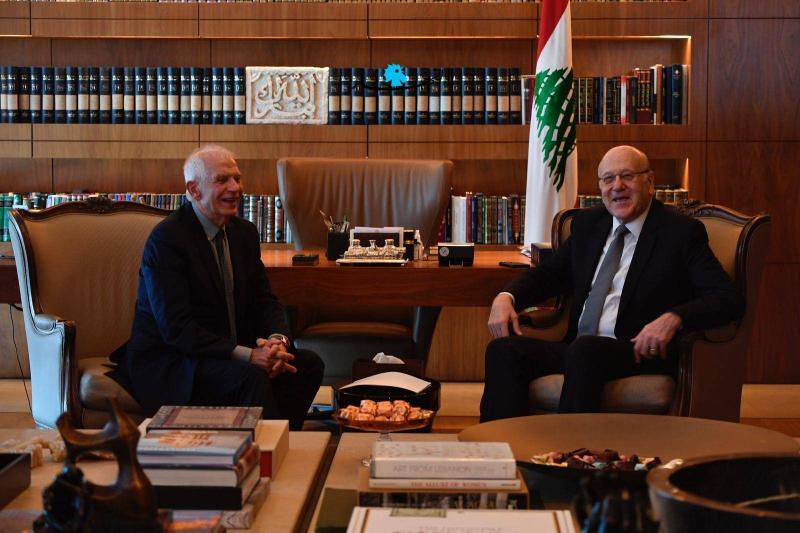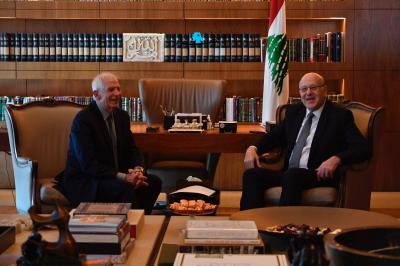Political sources accompanying the meetings held by the European Union's High Representative for Foreign Affairs and Security Policy, Josep Borrell, revealed that he received a Lebanese response to his call to avoid slipping into an expanded war and the necessity to contain Israeli escalation. This is to prevent Tel Aviv from dragging Lebanon into an open conflict along the northern front in the south, which would be difficult to manage.
These sources told "Asharq Al-Awsat" that Borrell did not come bearing an Israeli threat; rather, he feels that Tel Aviv is escalating its actions to provoke Lebanon, indicating that the danger remains present. This situation necessitates restraint and the exercise of the utmost responsibility to prevent a deterioration of the situation.
The political sources confirmed that Borrell’s meetings in Beirut were preceded by a green light from the United States, coinciding with the presence of U.S. Secretary of State Antony Blinken in the region, aiming to exert pressure on Israeli Prime Minister Benjamin Netanyahu and his war team to prevent the expansion of the war by igniting the northern front, which could broaden to include other fronts in the region.
The sources noted Borrell's meeting with the head of the "Loyalty to the Resistance" bloc, MP Mohammad Raad, stating that his assignment with this mission, as he is the most capable of communicating with Hezbollah's leadership, came with American backing. They highlighted that Raad assured Borrell that the party is not inclined to expand the war and would be compelled to adopt a self-defense policy if Israel chose to ignite the northern front. He reiterated positions previously declared by the party's Secretary-General, Hassan Nasrallah, on several occasions since the war began in October last year.
Raad's statements harmonized without hesitation with the positions conveyed to Borrell from Parliament Speaker Nabih Berri, caretaker Prime Minister Najib Mikati, Foreign Minister Abdullah Bouhabib, and Army Commander General Joseph Aoun. However, he conditioned the discussion of implementing UN Resolution 1701 on halting the war in Gaza as a mandatory step.
The same sources did not confirm whether Hezbollah links the negotiation for the implementation of the resolution to a cessation of aggression in Gaza, as an attempt to raise political stakes to improve its negotiating terms. However, it is in the party's best interest to leave this matter to the Lebanese government and support it, as it did in previous negotiations resulting in an agreement on maritime border demarcation between Lebanon and Israel, thus avoiding backlash from opposition accusations of monopolizing the decision on peace and war.
The sources asserted that Borrell was formally informed by Lebanon that Israel's insistence on expanding the war to the south would not ensure the return of settlers who were displaced from settlements along the northern front to their homes, as the war would not be a picnic for them. Therefore, the party would have to respond similarly, which could lead to a large-scale explosion of the situation that would extend beyond its northern borders with Lebanon.
In this context, the expansion of discussions regarding Israel's defiance of international resolutions and its refusal to comply provided the Lebanese side an opportunity to highlight various points supporting its position regarding Israel's deviation from the will of the international community and its rejection of UN resolutions, especially since it occupies Lebanese territory and refuses to withdraw from it.
Borrell also referenced Israel's second invasion of Lebanon in 1982, which reached Beirut under the pretext of eliminating the Palestine Liberation Organization and dismantling its military structure, and expelling Palestinian fighters from Lebanon to Tunisia. He also mentioned the July 2006 war with Hezbollah, which was officially established between 1983 and 1984.
However, Israel's ending of the Palestinian military presence in Lebanon did not stop its aggression against it, including violations of its land, air, and maritime territories, nor did it prevent Israel from keeping the Palestinian cause alive in the occupied territories. This also applies to Hamas, even assuming that Israel could end its military presence in Gaza, as the ongoing war has gained unprecedented support that extended to the West Bank and the 1948 territories. This influence cannot be erased from the equation, especially if international pressures lead to a settlement based on a two-state solution.
Borrell expressed understanding of the views of the individuals he met, primarily Berri and Mikati, who informed him of the necessity to intensify European action to find a just solution to the Palestinian cause, which is key to restoring stability to the region and paving the way for the implementation of Resolution 1701. It is noteworthy that it would have been more effective for EU states to differentiate their position from Washington's view of the ongoing war in Gaza.
The lingering question remains: Why does Hezbollah not initiate an openness towards its national partners, including opposition forces, to dissipate the tension and mobilization that do not serve to unify the Lebanese official stance in its negotiations for the application of Resolution 1701, instead of engaging the country in futile disputes characterized by mutual accusations?




